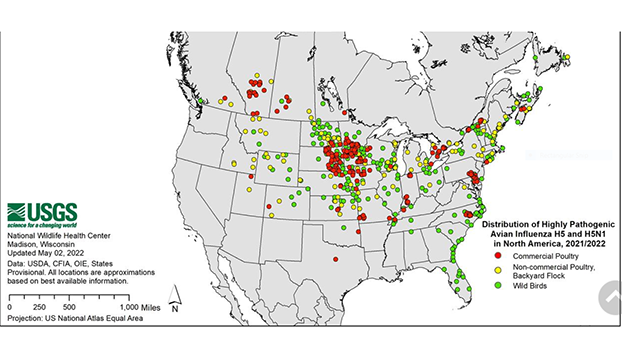So-called ‘Bird Flu’ in the U.S., but not Louisiana, LDWF says
Published 3:12 pm Thursday, May 5, 2022

- A map of reported bird flu cases in the US. Louisiana has not had any cases reported according to the Louisiana Department of Wildlife and Fisheries. (Courtesy Photo | LDWF)
|
Getting your Trinity Audio player ready...
|
BATON ROUGE — An outbreak of Highly Pathogenic Avian Influenza (HPAI), or bird flu, seen in parts of the U.S. this year has not been detected here, the Louisiana Department of Wildlife and Fisheries (LDWF) said.
The Centers for Disease Control and Prevention (CDC) considers the current risk of the outbreak to be low to the general public even in states where HPAI has been seen. While bird flu rarely affects humans, it can sometimes be deadly.
LDWF State Veterinarian Dr. Jim LaCour and LDWF Non-game Ornithologist Rob Dobbs do not recommend curtailing outdoor or bird-related recreational activities in Louisiana.
However, they do recommend following standard protective practices when dealing with birds and when coming into contact with surfaces or objects, such as bird feeders, that may be contaminated by bird saliva, mucous or feces.
Those protective practices include:
- Observe wild birds from a distance, avoiding direct contact with them.
- Clean bird feeders and bird baths regularly, about every two weeks, by scrubbing away debris and soaking in a diluted bleach solution for 10 minutes.
- Always wear rubber gloves while cleaning bird feeders and bird baths, preferably in an outdoor setting, never where food preparation may occur.
- If you find a dead bird in your yard, avoid touching it, but collect it in a plastic bag while wearing rubber gloves, then dispose of the carcass in an outdoor garbage bin.
HPAI is affecting wild birds and domestic poultry across much of North America, primarily in the Midwest and along the Atlantic Coast of the U.S. The U.S. Department of Agriculture’s Animal and Plant Health Inspection Service and other agencies have detected bird flu in wild birds in 34 states, the closest in Texas and Alabama, and in commercial and backyard poultry flocks in 29 states.
Only one human case of bird flu has been confirmed by the CDC in the U.S. during this outbreak. The case affected a commercial poultry industry worker in Colorado.
LDWF continues to monitor wildlife health statewide, ensuring awareness of any potential threat to citizens of Louisiana.
For more information on the bird flu outbreak and bird feeder care, please visit:
https://www.allaboutbirds.org/news/avian-influenza-outbreak-should-you-take-down-your-bird-feeders/
Rabbit Hemorrahgic Disease Virus Type 2 Update
Rick Hamrick, a Mississippi Department of Wildlife Fisheries and Parks Small Game Biologist, said there is no new detected cases of the rabbit disease. Mississippi’s first case of RHDV2 was detected in late September in a domesticated rabbit near Jackson. As of right now only four Southeastern states have detected the disease, Georgia, Florida, Kentucky and Mississippi. There has been no detection in wild rabbits yet.
According to the MDWFP website, the disease enters a rabbit’s body through the mouth, nose or eyes. The virus persists in the environment for a very long time and is resistant to deactivation.
The virus spreads through direct contact with infected live or dead rabbits. Humans, pets and livestock are not susceptible to the disease. Humans can spread the disease with rabbit fur on their clothing. It could spread through rabbit urine or feces in the bedding of domesticated rabbits, Hamrick said.
RHD has a mortality rate of 20 percent, on average. In localized settings, the mortality rate ranges from 5 to 70 percent. In this instance, 21 out of 22 rabbits died within a 6 to eight-day period. Currently, there is no vaccine for the disease approved for sale in the US. According to MBAH’s website, there is a vaccine for the disease in development and two vaccines, which could be imported with special approval. People can call (601) 359-1170 if they have any questions. As of right now, there is no evidence of the disease in wild rabbit populations in Mississippi.
Proper disposal of rabbits harvested while hunting would be field-dressing the animal on site. If you remove the animal from their home range area, it is best to place the remains in a garbage bag so it could be buried in a landfill rather than throwing it out into the woods, he said.
People should contact Rick Hamrick via email at Rick.Hamrick@wfp.ms.gov or the MDWFP at 601-432-2199 if they find large numbers of dead wild rabbits with no apparent signs of death. Those who have domesticated rabbits should contact the MBAH if they notice several domesticated rabbit deaths by calling 1-888-722-3106.





